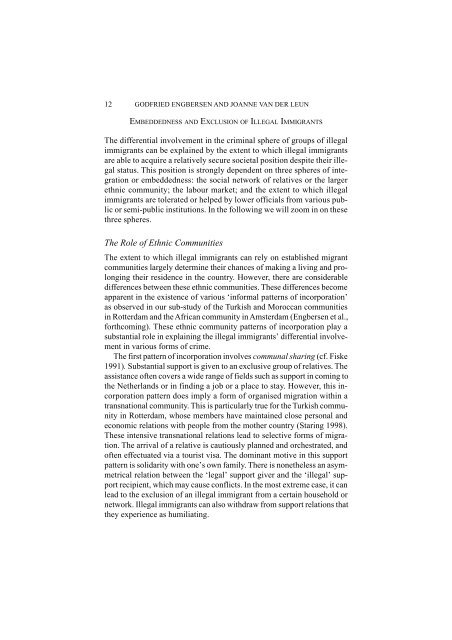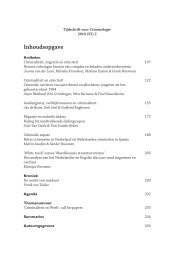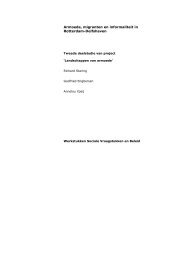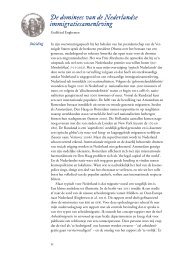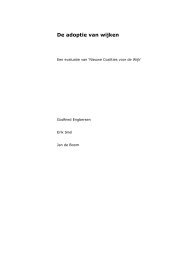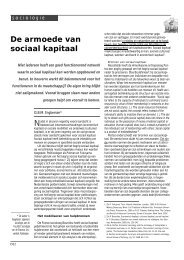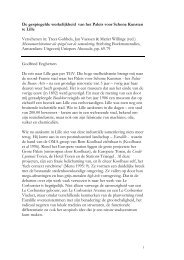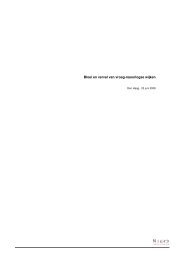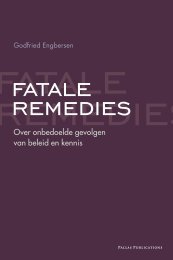THE SOCIAL CONSTRUCTION OF ILLEGALITY AND CRIMINALITY ...
THE SOCIAL CONSTRUCTION OF ILLEGALITY AND CRIMINALITY ...
THE SOCIAL CONSTRUCTION OF ILLEGALITY AND CRIMINALITY ...
You also want an ePaper? Increase the reach of your titles
YUMPU automatically turns print PDFs into web optimized ePapers that Google loves.
12<br />
GODFRIED ENGBERSEN <strong>AND</strong> JOANNE VAN DER LEUN<br />
EMBEDDEDNESS <strong>AND</strong> EXCLUSION <strong>OF</strong> ILLEGAL IMMIGRANTS<br />
The differential involvement in the criminal sphere of groups of illegal<br />
immigrants can be explained by the extent to which illegal immigrants<br />
are able to acquire a relatively secure societal position despite their illegal<br />
status. This position is strongly dependent on three spheres of integration<br />
or embeddedness: the social network of relatives or the larger<br />
ethnic community; the labour market; and the extent to which illegal<br />
immigrants are tolerated or helped by lower officials from various public<br />
or semi-public institutions. In the following we will zoom in on these<br />
three spheres.<br />
The Role of Ethnic Communities<br />
The extent to which illegal immigrants can rely on established migrant<br />
communities largely determine their chances of making a living and prolonging<br />
their residence in the country. However, there are considerable<br />
differences between these ethnic communities. These differences become<br />
apparent in the existence of various ‘informal patterns of incorporation’<br />
as observed in our sub-study of the Turkish and Moroccan communities<br />
in Rotterdam and the African community in Amsterdam (Engbersen et al.,<br />
forthcoming). These ethnic community patterns of incorporation play a<br />
substantial role in explaining the illegal immigrants’ differential involvement<br />
in various forms of crime.<br />
The first pattern of incorporation involves communal sharing (cf. Fiske<br />
1991). Substantial support is given to an exclusive group of relatives. The<br />
assistance often covers a wide range of fields such as support in coming to<br />
the Netherlands or in finding a job or a place to stay. However, this incorporation<br />
pattern does imply a form of organised migration within a<br />
transnational community. This is particularly true for the Turkish community<br />
in Rotterdam, whose members have maintained close personal and<br />
economic relations with people from the mother country (Staring 1998).<br />
These intensive transnational relations lead to selective forms of migration.<br />
The arrival of a relative is cautiously planned and orchestrated, and<br />
often effectuated via a tourist visa. The dominant motive in this support<br />
pattern is solidarity with one’s own family. There is nonetheless an asymmetrical<br />
relation between the ‘legal’ support giver and the ‘illegal’ support<br />
recipient, which may cause conflicts. In the most extreme case, it can<br />
lead to the exclusion of an illegal immigrant from a certain household or<br />
network. Illegal immigrants can also withdraw from support relations that<br />
they experience as humiliating.


